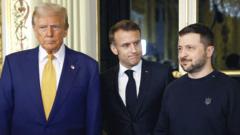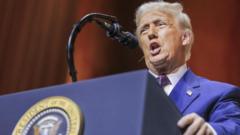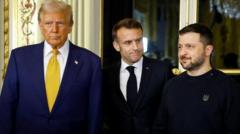Germany’s impending elections are proving crucial not only for the nation but for the entire European continent, as Trump’s second term poses unprecedented challenges and potential shifts in foreign relations.
Germany’s Upcoming Elections: A Pivotal Moment for Europe Amidst Trump’s Presidency

Germany’s Upcoming Elections: A Pivotal Moment for Europe Amidst Trump’s Presidency
As Germany heads to the polls, the outcome may shape Europe's response to a changing political landscape under President Trump.
In the wake of a failed coalition government, Germany is set to vote in streamlined elections this Sunday. The political climate has been notably altered since the U.S. election last November, with a new Trump administration taking a starkly different approach to foreign policy, particularly regarding Ukraine and Russia. European leaders are now grappling with the implications of a possible withdrawal of U.S. troops from Germany, which has historically maintained a buffer against potential aggression from the East.
Friedrich Merz, the leading candidate for chancellor, has articulated this shift emphasizing that it represents more than just a routine governmental change. "It is not just another change of government," he remarked during a rally in Oberhausen, underscoring the necessity for Germany to redefine its role on the European stage amidst heightened tensions.
With tensions flaring due to Trump's accommodating stance towards Russia, the next German chancellor will have to navigate delicate relationships with both the U.S. and Eastern Europe. This election is not merely domestic; its ramifications are expected to extend far beyond Germany’s borders and influence the entire European response to geopolitical threats.
As the election draws near, uncertainty looms in Germany, with citizens keenly aware that their votes will play a critical role in how Europe confronts an evolving global scenario. The upcoming election may define not only the immediate future of Germany's leadership but may also prove a decisive factor in shaping a cohesive and strategic European response in a newly complicated geopolitical environment.
Friedrich Merz, the leading candidate for chancellor, has articulated this shift emphasizing that it represents more than just a routine governmental change. "It is not just another change of government," he remarked during a rally in Oberhausen, underscoring the necessity for Germany to redefine its role on the European stage amidst heightened tensions.
With tensions flaring due to Trump's accommodating stance towards Russia, the next German chancellor will have to navigate delicate relationships with both the U.S. and Eastern Europe. This election is not merely domestic; its ramifications are expected to extend far beyond Germany’s borders and influence the entire European response to geopolitical threats.
As the election draws near, uncertainty looms in Germany, with citizens keenly aware that their votes will play a critical role in how Europe confronts an evolving global scenario. The upcoming election may define not only the immediate future of Germany's leadership but may also prove a decisive factor in shaping a cohesive and strategic European response in a newly complicated geopolitical environment.





















